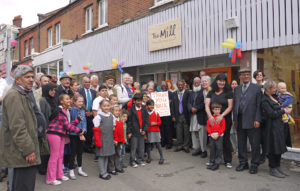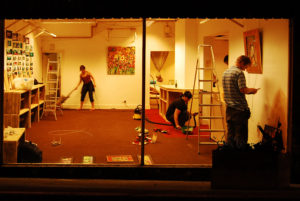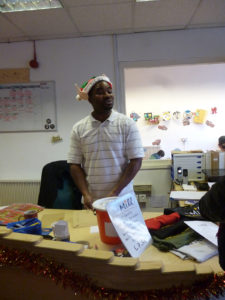5. Opening The Mill
Part of People Making Things Happen, a Big Lottery funded project exploring the history of The Mill.
Scroll down for transcript
1. Jenny Mensah
When The Mill opened 10 years ago, my dad was asked to cut the ribbon. So he was always pottering around Walthamstow especially our road and the surrounding areas, so people would always ask him for little sound bites or bits of advice. So, unbeknownst really, to me and my mother and my brother he was asked about opening The Mill. I think he was seen as a kind of voice of support for The Mill opening. So when it did actually open, they asked him to be one of the people to cut the ribbon, which was really nice. And he’s featured in the pictures on the launch day. At the time, I didn’t really know that much about it. But I remember he did a speech, a lovely speech. He died a few years ago, in 2018. And the people of The Mill wrote a lovely eulogy for him, which they included in my dad’s funeral book. So it was really lovely, the words that were said about my father. It seemed like he was a real sort of representation of community in the area and he came to sort of represent the hopes for the Mill which is very pleasing indeed.
2. Clare Coghill
It was right that it was an older gentleman from the local community who was front and centre in that event. And it was joyful. It was absolutely joyful. People had worked so hard to get it to that point, we’d had the local police in to help paint the building, Mo had got young people who’ve never been involved in anything outside of school before to come and hang an exhibition, they had their work on the walls. People brought food and, you know, just made it really, really special. But it was also I think it was the opposite from a lot of these events, because obviously, I’ve been to plenty over the years, in that it felt like the beginning of something. It wasn’t like a private organisation have come in and plopped a load of money into a community group and said, right, there you go, that’s our corporate social responsibility done. This was grown out of the community and the community would make it flourish.
3. Claire Witney
I felt very excited, I felt, if I’m honest, I guess I was a bit scared, because it felt sometimes, like you’re walking a bit of a tightrope. Because it did spring from, it did come from a campaign, it did come from something that was quite negative and controversial. And so it sometimes felt, you know, sometimes when you’re working, and I still have that to this day, when you’re working with communities, you are translating, and trying to form up agreement and alliances, and develop positive relationships and positive dialogue. So I think I got quite excited, I remember, kind of going in there thinking, Gosh, this is amazing, and really wanting to go down there sometimes, and being in the office thinking, oh, I want to go have a look, see what they’re doing. And also, because I live in Walthamstow, I think that was the other thing, I’ve lived in Walthamstow for a long time, 30 plus years. And it was great to see something so positive happening, because Walthamstow’s a very different place to when I first moved in, but it was just great that there was this real interest in local people, and it was very inclusive, the diversity of the community really felt like it was reflected in the people who were going into that building. But partly, I remember Alison saying it was partly because there was an understanding that for people like me, we have that kind of a sense of entitlement, that if I saw something like that, I’d walk in, because I feel confident. I remember Alison saying, we have to recognise that people don’t have that sense of entitlement, so we have to do things to really make people feel like this is their space. And this is part of their community. And I think that was really inspiring. And yeah, I did get quite excited. And I learned so much, I learnt so much all the time there. I now work for another borough and I still talk about The Mill sometimes as an example of what happens when you really empower and enable communities, and people in communities have a bit more control. And, you know, what they can actually do, that statutory agencies just have no chance of doing. So yeah, I think I was quite personally excited and engaged in that.




 Follow
Follow